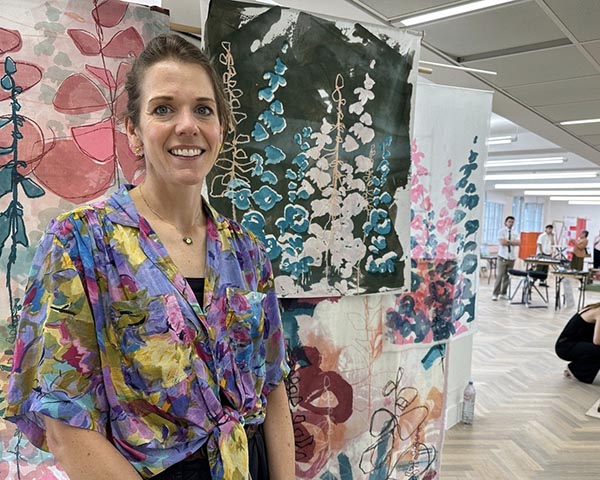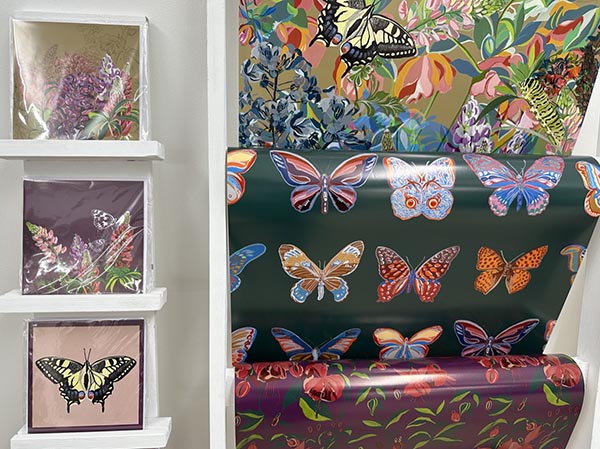Textiles expert and WhatTheyThink contributing writer, Judith Smith, brings us the most recent news about the Green Grads programme. Green Grads is a program that celebrates new talent in the UK and places an emphasis on sustainability and environmental balance. It promotes new ideas, concepts and innovations that can encourage and bring about environmental change. It encourages younger people to enter the textiles industry and design apparel, allowing the industry to move forward towards a sustainable future.
The Green Grads Hub, which aims to nurture the next generation of graduates, was held in Heals, London at the beginning of September 2023. The project, which relies on donations only from the industry, was in its third year. The professionals involved incur minimal costs and do not charge any fees.
This year’s sponsors included Designers Guild as well Anglepoise FESPA Epson Chelsea Design Centre Heals Ercol Neptune ImageCo Benchmark Benchmark Benchmark Benchmark Benchmark Benchmark Benchmark Benchmark Benchmark Benchmark Benchmark Benchmark Benchmark Benchmark Benchmark BenchMark Benchmark Benchmark Benchmark Benchmark Benchmark Benchmark Benchmark Benchmark Benchmark Benchmark Benchmark Benchmark Benchmark Benchmark Bench Markmark Benchmark Benchmark Benchmark Benchmark Benchmark Benchmark Benchmark Benchmark Bench The project continues to run throughout the entire year. Pop-up workshops are held. It also facilitates networking and commercial partnerships with graduates.
Barbara Chandler and Michael Czerwinski, in their roles as FESPA Textile Advocates, founded the platform with my support as a Textile Design, Technology, and Sustainability consultant.
Green Grads celebrates new talent and sustainability. Green Grads 2023 was a gathering of new graduates with new ideas and concepts, who were all working to create environmental change. The event brought together 55+ UK graduates across multiple product disciplines. The event was held over three days in the beautifully refurbished third floor of the Heal’s Building, where Green Grads installed a theater for a series of engrossing events which included awards, speeches, and discussions.
This year’s winner of the ECO STORIES, Epson Design Challenge, for patterns/fabrics that nurture the environment, was won by talented graduate Becky Brentnall and her “The Garden That Inspired” printed textile collection, winning a cash prize of £350.

Becky Brentnall and her “The Garden That Inspired” printed textile collection. BA Surface Pattern and Textile Design Staffordshire University, @becky_designs.uk
Becky’s childhood garden inspired in her a lifelong passion for nature and in particular for flowers grown in the UK. The result is a series of textiles up to 4 meters long. The textiles are hand-painted or screen-printed on natural fabrics, using manutex. Manutex is a thickener based on seaweed that transforms reactive dyes to a paint or print paste. Becky was a landscaper, florist and trained as such before she returned to school.
“My work celebrates and promotes nature on a large scale, and I want it to enrich home and business interiors,” Becky commented.
Becky’s final collection celebrates nature and her love of print. As a mature student, she now seeks a career in design and print and is looking to expand her design practice to found her own studio alongside building her own brand using digital printing technologies to replicate her original works as interior décor products and accessories.
Joint winner of the ECO STORIES, Epson Design Challenge, for patterns/fabrics that nurture the environment with a generous prize of an Epson F100 printer, was Zaynah Arif’s Lepidoptera.
Zayna’s beautiful hand-painted artwork carries a strong message. With numbers of butterflies and moths declining, Zayna is adorning stationery, coordinating wrapping paper and giftware, together with unique reversible appliqué bags, with images that call attention to their plight.
“We must campaign to save all the pollinators in the same way as we have campaigned to save the bees,” Zayna stated.
Zayna stated that she would create a Butterfly Conservation collection and give them the entire proceeds. We look forward to her brand growing in harmony with her environmental objectives.

BA Textiles and Surface Design University of Bolton, @zaynaharif_designs
Annelise Payne & Chloe Benham were also worthy of mention, and may be a sign of the future for textile ink innovation.
Annelise Payne, Winner of the Textile Innovation Award for “Primordial Pigments”
Enthused by the Arts & Crafts movement, Annelise sourced bacteria from soil and water around the original William Morris textile workshop in Merton Mills and developed a “fully microbial” color palette. She then block-printed an inspired Morris design onto fabric using bacteria instead of conventional dyes.
“This process gives equal agency to living organisms, letting the bacteria grow and develop over time to reveal colors and patterns on the fabric.” She added: “William Morris took inspiration from the many flora and fauna that surrounded him. He argued for the preservation and use of traditional crafts, as well as natural materials. This was in opposition to the Industrial Revolution. (In 2023, we will also reject mass production in favor of manufacturing on demand). I’m taking his ideas into the 21st century.
“Bacterial pigments grow independent of season, and need no chemicals or land and very little water. They could provide a more regenerative solution to color and dye within the textile industry,” Annalise explained.
This designer from Salt Lake City in Utah has worked on projects that used kelp, wool, and mycelium.
MA Material Futures, Central Saint Martins, UAL @annelisepayne
Chloe Benham Presented “Microbial Hues”
Chloe has explored ways in which “living” color systems using bacteria could provide a circular alternative to petrochemical dyes. Focusing on the aesthetics of her work, she developed a successful new printing technique that combines bacteria and plant dyes. “We have a responsibility as designers to challenge the norm.”
MA Textiles, Royal College of Art @chloebenham
Elena Branch: “Art in Action”
Elena Branch was also a pleasure to see again after a year. Elena was showing off her growing design business. Her design practice has grown into a small artisan business as a Green Grad 2022.
Elena Branch uses a portfolio of art prints, cards and fabrics that are inspired by Russian constructivism to fight the climate crisis.. Her bold motifs, expressed confidently in striking abstracts, speak powerfully about environmental perils, such as melting ice cap, plastic pollution, or bleached corals. The Climate Collection is a new range coordinating heavy weight cottons for upholstery and curtains, which are GOTS and OEKO-TEX certified for both fabric and ink (£65 a meter). Urban Upholstery, a London-based upcycling expert, has upholstered them onto a chair that was rescued. “I’m using illustration and prints to raise vital awareness of the current climate crisis,” she said. There are also tea towels and cushion covers available.
BA Textile Design with Business Studies, University of Brighton @elenadrewthis in partnership with @urban_upholstery_ltd
Frieda Bischoff and Vassi Deij: “Renee Materials”
Finaly, it was wonderful to meet Frieda Bicoff and the founding Renee Materials team who are reinventing resale and recycling waste.
“On a planet with diminishing resources, we need radically to change the way we source and dispose of materials. Companies and businesses account for 28% of London’s waste—and more than 60% of what is thrown away is reusable. At the same time, UK art and design students could be spending as much as £400 on materials for a project.”
Renee has set up a digital marketplace that connects companies’ leftover waste with art and design students, creatives, and makers who need supplies.
“We save emissions twice. We reduce waste and we also cut down on the use of new material. At the same time, we ease the costs for creatives, who typically reduce what they have to spend on high-quality materials by half.”
MA Design for Social Innovation and Sustainable Futures, London College of Communication, UAL; www.reneematerials.co.uk @renee_materials
Green Grads spotlights yet another new generation. This one is determined to have a major impact on how products are designed, created, and repurposed to benefit the environment.
Thank you to all that supported this initiative, without which Green Grads wouldn’t be possible. I’d also like to personally thank all the industry professionals and peers that gifted their time, expertise, and knowledge.
All images courtesy Texintel.
www.texintel.com